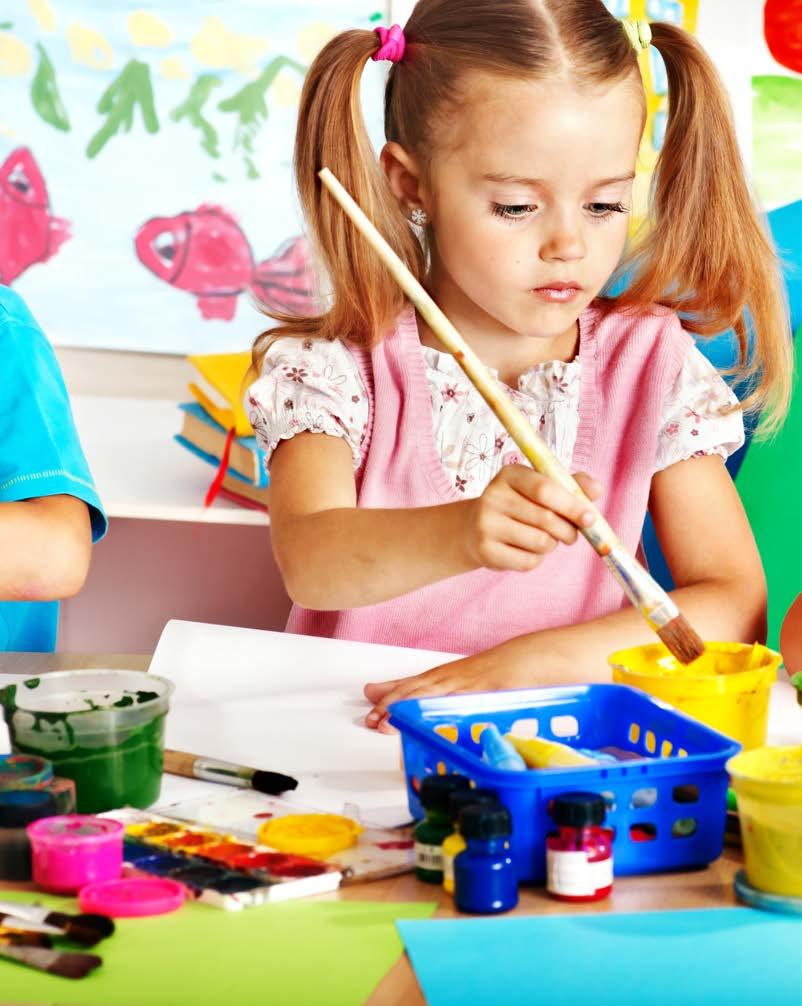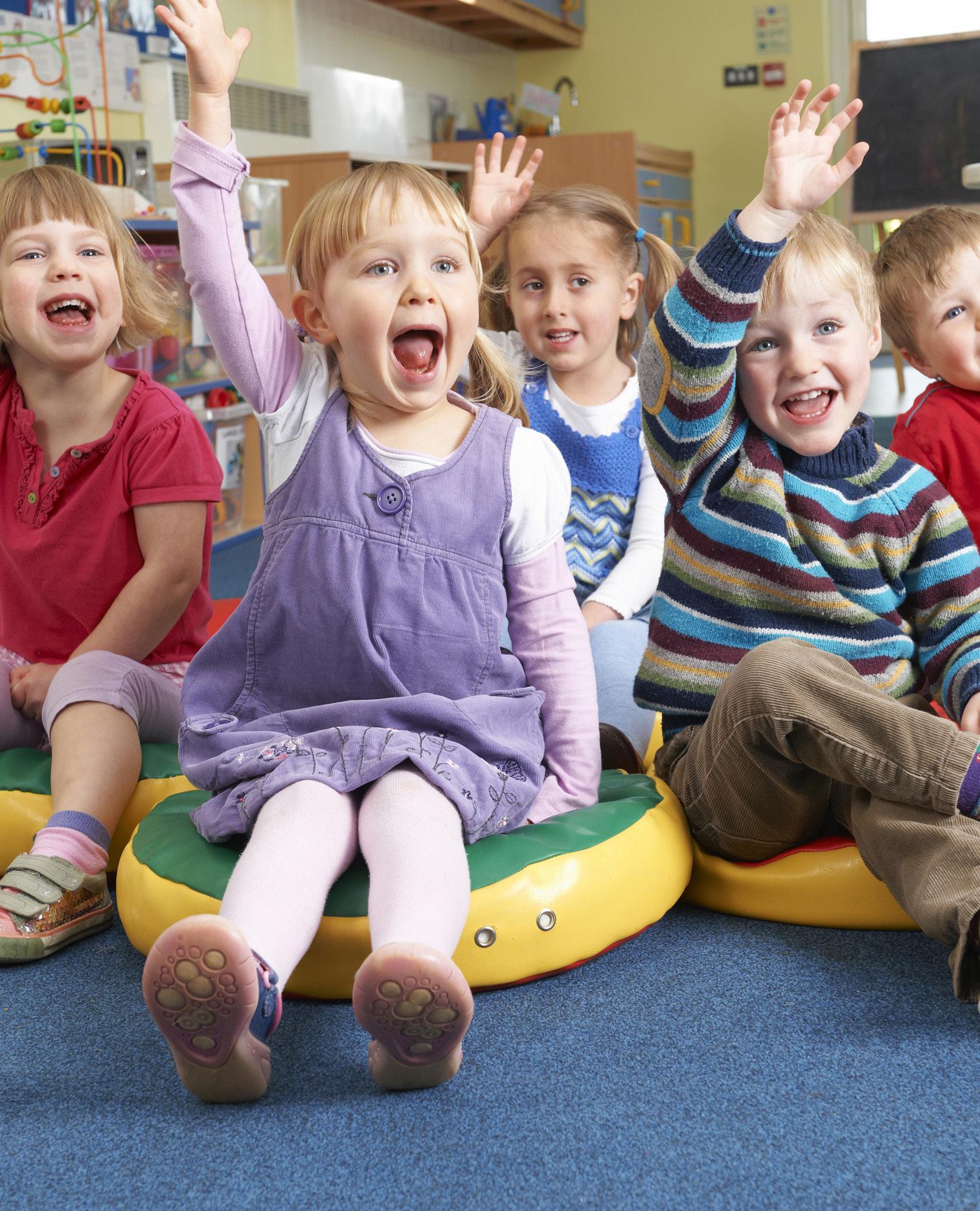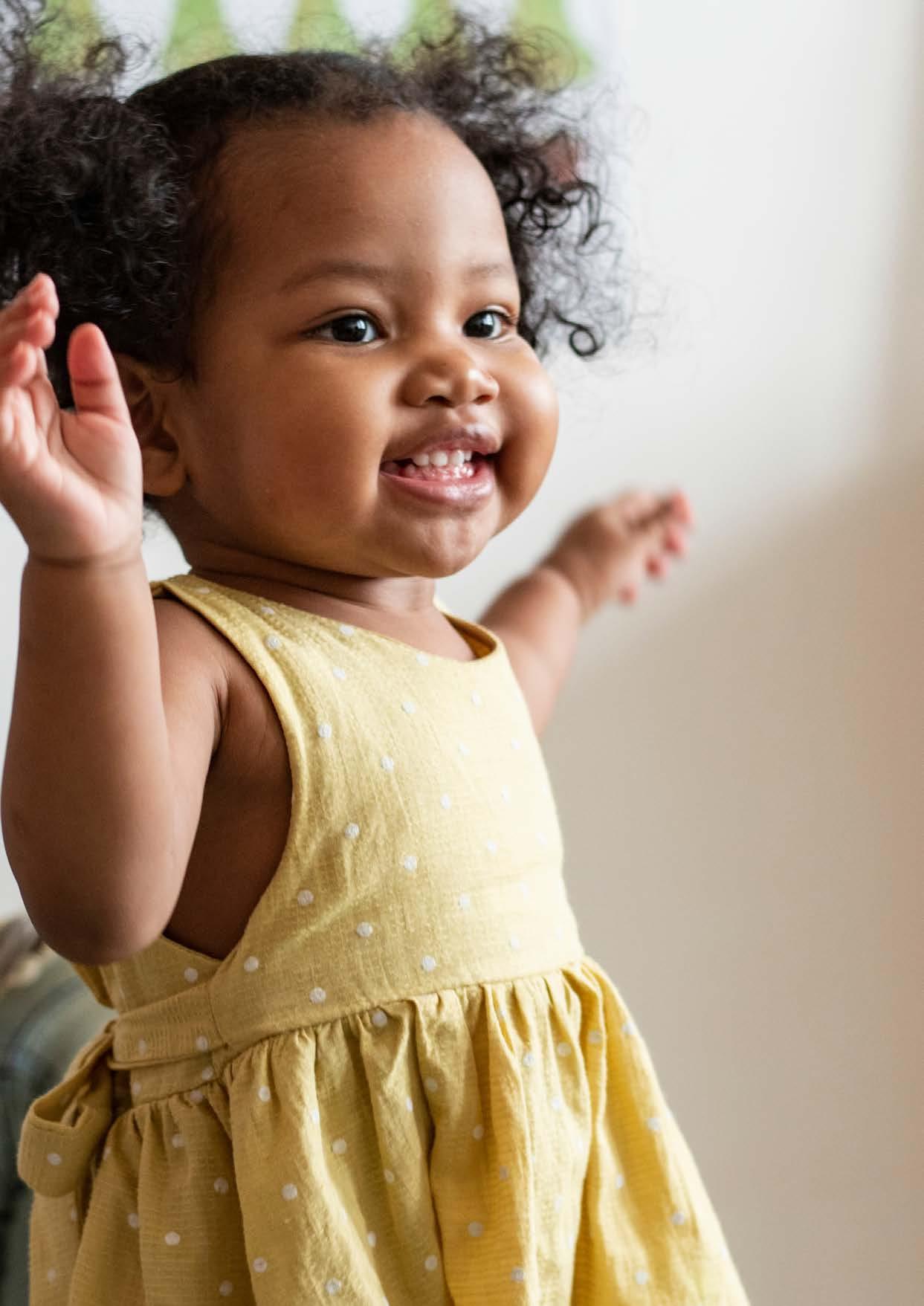






This document outlines our Early Years and Pre-School Centre nursery curriculum.
Our curriculum has been created with our intentions of learning, development and teaching; our implementation within the provision; and the impact that our curriculum holds on children’s development, learning and growth.
Our curriculum has been designed through the implementation of the areas of learning: communication and language; physical development; personal, social and emotional development; literacy; numeracy; understanding the world; and expressive arts and design.
Each area of learning has been embedded with the intent, implementation, and the impact.

‘Children’s spoken language underpins all seven areas of learning and development. Children’s back-and-forth interactions from an early age form the foundations for language and cognitive development.’ (EYFS, 2023)
To develop all children’s knowledge and skills in all areas of communication and language development, at their own pace building their interactions, exploring language and listening and understanding. To help children make sense of the world, build foundations for literacy, making sense of visual and verbal signs. To help children interpret different sounds.
Interaction is essential within this area of learning; this is implemented throughout the nursery, with all staff interacting with all children throughout the day within the nursery. We implement a rigid regular familiar routine; all children are greeted as they arrive at the nursery and are asked to follow instructions of putting their coats and bags on the hangers, using their listening skills and attention to follow instructions.
Throughout the day the children are reminded of the clear nursery rules – listening ears, watching eyes, kind hands, inside voices and walking feet, with the support of visual prompts. During mealtimes, all staff interact with the children through asking the children to wash their hands whilst modelling with actions, naming cutlery, presenting choices between milk and water.
During circle time, which is implemented twice a day, the staff interact through singing the ‘Hello Song’, and ‘Days of the Week’; nursery rhymes with the children; sharing stories and books; and talking about our feelings with the support of mini minds matters approach. During the ‘Hello Song’ all children present their names around the circle with the support of the listening dinosaur and practitioners.
Interaction within the baby room is implemented through the course of each day. As the children play and explore, staff will interact through actions and talking, to model speech and language to the children and ask and answer questions continuously throughout the day.
We build babies communication through movements and sounds; staff are continuously very observant of the babies and provide praises and encouragement through facial expressions and body language and face-to-face interactions. Staff interact through singing nursery rhymes, ‘Hello Song’ and modelling words and sounds throughout the whole of the nursery day. Children’s interests and likes are noted and understood and are offered and implemented within play, and activities engage initial interest.
We support listening and understanding through asking questions, providing clues and prompts and modelling continuously through play using positive praise and encouragement.
We offer different tailored learning programmes centred round children’s ages and abilities. We plan for and provide focused daily phonics and language through listening sessions where the children are split into age/ability groups and fun activities are planned for and delivered by staff, supporting and developing listening and understanding skills.
All the pre-school children take part in circle time twice daily, singing repetitive and familiar songs and undertaking familiar activities. We have also put into practice additional resources to support children which may need additional help within communication and language. WELLCOMM 1 to 1 sessions take place when needed to assess any specific support needs any of our children may have that will help with our planning.
Our daily routine and structure of the day supports children with their listening and understanding skills, through following instructions and showing their understanding. The environment has also been designed to provide children with quiet spaces if needed for more focus and listening.
Exploring languages is developed through our phonics sessions, in which children explore sounds, words and letters, leading from conducting words into sentences through a variety of planned activities. Both within the pre-school and baby room, staff encourage interaction, exploring languages and listening and understanding using nursery rhymes, stories and books.
Staff further support children exploring language and acquiring new vocabulary through asking questions, providing comments and modelling new words. With the support of our language-rich environment, children can explore new words within every area of the setting via labels and visual picture prompts.
Children’s speech develops from the earliest age, starting with babbling which leads to words. With interaction that we implement, children develop a lot of vocabulary and can explore language through our environment.
Our children will learn to communicate effectively; maintain good interactions; and take turns and wait, building confidence, independence and social relationships. They will also be able to show empathy and share emotions.
Children will follow and use visual clues, join in with play and extend language skills. They will develop back and forth interactions, developing quality conversations and building language effectively.
To support and develop children’s physical skills, good health and healthy eating. To develop core strength and coordination, gross and fine motor skills.
‘Physical activity is vital in children’s all-round development, enabling them to pursue happy, healthy and active lives. Gross and fine motor experiences develop incrementally throughout early childhood, starting with sensory explorations and the development of a child’s strength, coordination and positional awareness through tummy time, crawling and play movement with both objects and adults.’ (EYFS, 2023).
In our setting children and staff use stretch and breathe group sessions, which supports repetition, modelling and imitating actions and movements. Children also make choices and demonstrate actions by taking part in planned stretching and coordination activities using balance.
We have a large soft open outdoor play area for babies and one for pre-school, which provides tools and set equipment to build core strength through rolling, sitting, standing, walking, and developing postural reflexes. The area is also surrounded with resources for children to explore like soft play balls, rattles and different textured objects for fine motor purposes and coordination.
Within our pre-school room the children can explore the finger gym which focuses on fine motor skills, and is full of resources to ensure that children are developing their visual development, concentration, and hand-eye coordination.
Both babies and pre-school have free-flow access to the outdoor provision; from the baby area, children can explore a soft-floor play area which holds pots, pans, a playing house and a tough tray in which staff create sensory activities. A slide supports children’s gross motor skills and balance.
The pre-school outdoor provision consists of a climbing frame, slides, small trampoline, obstacle course, construction area, and a variety of bikes for the children to practice their balance skills on; these all encourage limb coordination as these encourage the children to move their bodies in a variety of different ways, and push and challenge their abilities.
Our provision and resources also allow for children to complete safe risk taking, through the obstacle course and climbing frame which allows them to explore balancing, coordination, and gross motor skills.
Outdoor resources, such as small and large soft play balls and slides, allow children to develop strength, control, and balance within their gross motor skills. Negotiating the steps and working out how to manoeuvre their bodies, only assisting when the child really needs assistance, also supports this.
Our gardening area, sand area, finger gym and puzzle toys all provide children with fine motor skills.
All staff ensure that when children are taking safe risks or playing independently they are observed, monitored and safe.
Our free flow system ensures that children can make choices and have the freedom of choice when playing. Staff will naturally stretch and challenge individual children’s skills and abilities.
By the time children leave our setting for school they will have the ability to pursue happy, healthy, and active lives.
They will have built fine motor skills that help with eating, writing and getting dressed; have the ability to keep position and move from the centre of their bodies; developed core strength, coordination, fine and gross motor skills; developed stability and balance; and will be practiced in physical activity and strengthening of muscles, ready for their further school journey.
‘Children’s personal, social and emotional development is crucial for children to lead healthy and happy lives and is fundamental to their cognitive development’ (EYFS, 2023).
Our intention is to help children to gain and hold knowledge, understanding and care to socialise, form relationships, gain a sense of self and emotions.
We intend to build acceptance, resilience, confidence and control, a sense of identity and sense of self.
Within the pre-school room the Mini Minds Matters approach supports children’s learning and development of emotions. Sensory activities, and the use of Wellasaurus during circle time, gives opportunities for children to express and speak about feelings and emotions with prompt cards.




On entry at induction all parents complete an ‘all about me’ book which identifies children’s likes, dislikes, comforts, needs and home language. This book ensures that all staff can support children’s transition into nursery by making them feel secure, happy and safe, and it also ensures that children create secure bonds with staff.
We ensure that during the first two weeks of the settling period, a key person is assigned to each child to create a bond/ attachment. This ensures that children can begin with a secure foundation. With the support of parental input children can confidently, within a secure environment, begin to build their sense of self.
A routine within the nursery is created that the children are supported with daily through verbal, word, and picture prompt cards. This creates more security, consistency and stability for the child, fundamental for discovering and developing their sense of self.
Within the nursery the Mini Minds Matters approach is embedded. Staff support this approach through the creation of activities with feelings, emotions and sensory exploration. For example, exploring senses like smell through scented materials, play-dough and feeling prompt cards.
As a team we ensure that all children receive choices; this occurs throughout the day, such as mealtimes, with children choosing their own drink of choice. Through this, staff are providing children with a self of self and allowing them to make independent choices , which gives a positive feeling.
Here at the nursery, we have created a home from home environment, which provides peace and calmness and creates bonds and security. Children benefit from this environment through feeling more secure, safe, and comfortable leading to the creation of successful relationships.
Our home from home environment, and the curiosity approach embedded within, provides children with more choice making, independence, safe risk taking and exploring, There are also opportunities for social play with peers, creating bonds and leaving children feeling secure.
Through our selected book resources, children can explore and learn more regarding a variety of relationships, friendships, emotions, and feelings. It is our fundamental aim for children to build meaningful relationships and to use their social skills within the nursery and further life. Staff ensure this through the creation of activities, tasks and learning opportunities, with children playing and learning together daily.
At the end of the children’s time at the nursery children will have developed acceptance, resilience, confidence and control, a sense of identity, empathy and sense of self, the feeling of identity and understanding emotions. They will have and be able to Create relationships will be able to socialise comfortably, at their own pace as individuals, they will be able to build trust, safety and security between children and others. They will be experienced in choice making, safe risk taking and independence which also supports sense of self.
‘It is crucial for children to develop a life-long love of reading. Reading consists of two dimensions: language comprehension and word reading.’ (EYFS, 2023).
Children to discover their love for literacy, reading and early phonics. We aim to develop reading comprehension, exploring words and writing.
Throughout the nursery we have implemented a wide range of different books, within the baby area the books include a range of sensory properties and interesting illustrations for children to engage with and explore their curiosity. Within our pre-school area, the books have been chosen for all stages of learning and development. We have ensured that these also support EAL children and children with additional needs.
We encourage babies from the very start to show interest and curiosity for books. Staff interact with the children by introducing vocabulary from the books, modelling pointing as communication, presenting positive facial expressions and encouraging children to turn pages.
Within the pre-school room children can enjoy a variety of books, however more specifically within the reading area. Staff encourage and support children with reading and exploring books by communicating and asking questions about the book, and what the children can see.
During circle time, staff and children explore books through staff reading, asking the children a range of questions, and discussing what is happening within the book with the children.
To ensure that the children are developing their love for reading and books, each area holds story book sacks which contain the books, nursery rhymes, poems, and puppets. Books and stories are also available for children to explore within the outdoor area, within a reading hut
To create and encourage familiarity and consistency with reading, we have our top 5 stories which the staff explore with the children, and the children can explore these further through inspired activities.
Staff extend and introduce new vocabulary to the children, ensuring that children have the time to process their thinking, ask questions and present their ideas and thoughts. We also encourage children reading and exploring books at home; within our reception, where parents pick and drop off children, we have a borrowing library full of books that the children may take home to explore. The children also can gain more experiences of a real-life library, through visits to the College library.
Our setting’s enabling environment ensures that words are displayed for children to explore throughout the nursery on display boards, labelled furniture, resources, books, magazines, menus, and objects within play areas such as the home corner.
Children can explore words throughout the day. Within the baby area the children are introduced to words from books, displays, staff interaction and communication and songs.
Within the preschool room children explore words through interactions, communication, play, the environment, daily phonics sessions, songs, books, and discussions within circle time. Additionally, within circle time children and staff explore a range of books via the illustrations, discussions and picking out words together, which supports children with their phonological awareness.
We encourage children to start writing skills through mark making, strengthening hand muscles and drawing. We ensure that children within the baby room have areas to practice their fine motor skills and writing through mark making in a range of materials such as sand and Play-Doh; rattles for hand control; sensory exploration; a treasure basket to spark curiosity for different materials; and textures and messy play.
Within our pre-school room the children participate within phonics sessions twice a day. They learn, practice, and have fun with different sounds, writing them within their own individual books; this also supports school readiness.
Children can also explore the nursery’s writing area, which provides children with different writing materials, different-sized pencils, and writing templates with picture cards.
Our finger gym also provides children with strengthening finger and hand muscles, which leads and supports pencil control.
By the end of our children’s nursery journey, they will be school ready and will have developed words and widening vocabulary, preparing them for word reading within future learning.
Children will gain lifelong skills to communicate and express themselves. They will build hand muscles in preparation to write and support literacy learning. They will have developed oral language, and will be able to comprehend what is read aloud for themselves, and they will have the early skills required for later writing composition.
Children will understand the meaning of words and have an understanding of sentence structure; will have a curiosity and wonder about the world; and will have the foundations to be passionate and lifelong readers.
Children will have phonological awareness and expressive language, vocabulary and grammar. They will gain the understanding that symbols carry meaning in preparation for reading later.
‘Developing a strong grounding in numbers is essential so that all children develop the necessary building blocks to excel mathematically. Children should be able to count confidently, develop a deep understanding of the numbers to 10, the relationship between them and the patterns within those numbers.’ (EYFS, 2023).
For children to develop and present early mathematical knowledge, skills, and number concepts. To develop skills and knowledge of numbers, patterns and connections and spatial reasoning.
Number recognition begins from the very start. Within the baby age group staff ensure that children are exploring number recognition through a variety of nursery rhymes, with the support of props; modelling number names verbally; and through picture cards and story books.
We ensure when planning that our activities are implemented with maths, counting and numbers. During circle time twice a day, we count with the children from 0-5 for 2 to 3-year-old children, and 0-10 for 3 to 4-yearold children. We also have nursery rhymes and songs with counting and numbers and have embedded numbers and counting within the environment, within the construction area, crafts area and outdoors.
The range of resources that we have implemented support children’s learning with pattern and connections; within our baby area there are puzzles, shape sorters and connecting toys. Furthermore, we implement nursery rhymes and songs, for connecting patterns and noticing repetition, which occurs during our daily routine and nursery rules.
Within the pre-school area the children can explore a range of different resources which support pattern and creating connections, such as connecting magnets, musical instruments, blocks, songs and nursery rhymes. Both areas also include a music area, which the children and staff explore together or independently, focusing on the pattern of rhythm, taps and connections between the hand action and the noise that the musical instrument makes.
Staff encourage vocabulary such as next, stop, listen and repeat. Additionally, children can explore music and repetition. To support making patterns and connections further, the children also participate in language through listening, which uses music and actions which also implements pattern and making connections.
We as a nursery believe that songs are a crucial part of supporting this area, therefore the children participate within a lot of singing and musical sessions. They can repeat and notice pattern such as ‘head, shoulders, knees and toes’.




We implement spatial reasoning through resources such as building blocks and a construction area, both within the baby area and pre-school. This provides children with the support of adults to combine objects; how one objects fits into another; building with reasoning and thinking skills; and arranging from small to large.
Our open-floor baby area includes a variety of open-ended resources with the support of the implemented curiosity approach, from which babies can recognise their spatial reasoning of body parts and movement.
We have created a home corner both within the baby and pre-school area, which provides pots, pans, stacking cups and shape sorters, supporting children with spatial reasoning.
Our outdoor area includes a construction area with an obstacle course, which supports understanding within spatial reasoning. Staff support and implement this, encouraging vocabulary that supports children such as ‘up’, ‘down’, ‘inside’ and ‘below’.
By the end of nursery, the children will have number, spatial reasoning, and pattern and connections. They will develop a positive attitude to maths and will not be afraid to make mistakes. Children will understand routine and will have curiosity and engagement, as well as foundations for recall and counting sequences. They will understand spatial reasoning, understanding how objects can move within a three-dimensional world, such as one object fitting into another.
Patterns and connections are crucial within maths development, as they are the centre of maths; noticing patterns allows children to develop and support their early mathematical thinking skills.
Patterns and connections learning has been implemented within our setting through resources such as building blocks; songs and nursery rhymes; staff support; and musical patterns. These impact children’s understanding and learning of patterns and connections.
‘Understanding the world involves guiding children to make sense of their physical world and their community. The frequency and range of children’s personal experiences increase their knowledge and sense of the world around them – from visiting parks, libraries, and museums to meeting important members of society, such as police officers, nurses, and firefighters.’ (EYFS, 2023).
To support and teach children’s recognition and understanding of the world and community. To support children to reflect on and embrace personal experiences, develop an awareness and understanding of the diverse world, and support in widening children’s vocabulary.
Our provision’s environment holds an area within both rooms for understanding the world, giving children the chance to explore different animals, environments, weathers, seasons, occupations and many more.
This is accomplished through our chosen resources within the area. Staff support children as they play through asking questions, modelling vocabulary for all resources, and interacting with the children through their own experiences.
During our daily circle time, children can share their personal experiences through our ‘news time,’ from which staff can present their ‘news’ or an experience, and each child holds the opportunity to share theirs. Turn taking, waiting for their turn, and listening to others supports the nursery rules and British Values.
All events, celebrations and birthdays are celebrated within our nursery. We ensure that all children participate by using specific resources chosen for the event, such as card creation or music activities. We make the celebration day as special as we can for all.
We ensure that staff can create a bond with babies and their experiences by children being present when the caregiver/ parent interacts with the child’s key person; this provides children with new experiences and an understanding of the world around them.
We also explore widening children’s experiences through a variety of ways; visits from the College staff such as the science department; visiting the College and community on trips; and activities such as cooking.
We accomplish cultural capital through ensuring that all children have the best possible start to their developmental journey through widening experiences, monitoring development, parent partnership and exploring the community and world around us.
Our setting explores all cultures, religions, families, and traditions, using our wide variety of books, and celebrating cultural and religious events and traditions, as we create and implement high-quality activities.
We welcome all visitors to the nursery from the College, who complete sessions with the children from all different occupations, such as science. We explore all occupations through planning rich activities, resources, and tasks through our weekly planning. We celebrate, plan, and implement events and celebrations from all around the world alongside our weekly planning.
Within our provision we explore the natural world via ecological awareness, exploring seasons, the weather, plants, and animals; resources; focused activities; circle time, in which children engage with discussions and conversations, as well as exploring picture cards to create the association between word meaning to picture; and within our outdoor provision. Our environment also holds a technology area, in which children can explore the computer with the support of staff, playing phones and keyboards.
Children are supported with their technological world learning through staff modelling vocabulary, asking children questions to spark their curiosity. Thinking skills and labels are present for children to associate the written word with the objects.
We ensure that children learn and develop their social and cultural inclusivity through different religions, language spoken and pronunciation of names. Staff support children through discussions with children, introducing new vocabulary, and creating special events.
By the time our children leave nursery to go to school they will further understand the diverse world; have a widened vocabulary; and will have positive attachments, ensuring they can begin to understand their personal experiences.
Children will learn to become curious of others. They will build their vocabulary and describe their experiences and will understand the diverse world with an awareness of cultures, traditions, family structures, disabilities, gender and religion, world events and occupations.
Our children will also have an understanding of technology, ecological diversity and cultural inclusivity, and the impact people have on the environment. Our children will develop a sense of awe and a wonder of the world.
‘The development of children’s artistic and cultural awareness supports their imagination and creativity. It is important that children have regular opportunities to engage with the arts, enabling them to explore and play with a wide range of media and materials.’ (EYFS, 2023).
Children to explore their creative potential and have the freedom to express themselves. To build imagination and creativity, self-expression and the ability to communicate through arts.
We provide children with the tools, support and rich environment to spark children’s imagination and creativity.
Within our pre-school and baby room children can explore mark making, crafts, modelling, malleable, writing and drawing stations, with a range of different fabrics, tools and colours.
Children can also explore the role play area, which includes dress-up costumes and accessories for children to spark their imagination. Our music areas also provide children with imagination and creativity through sounds and tempo; we build skills through a role play area; have tools for creating art with creativity.
We have a curiosity approach which provides open-ended materials, objects, resources and textures, supporting children and sparking their creativity and imagination. There are opportunities for supporting creativity and imagination, with open-ended materials such as cardboards and bottle tops.
We provide a wide range of resources for children to demonstrate self-expression through paints, brushes, sponges, dabbers, Play-Dough, mark making, paper, card, materials, fabric, small world play, music and instruments.
We support children with self-expression through asking questions, providing ideas, interacting with conversation, introducing dynamic language vocabulary such as pattern, horizontal, rotation and vertical. Additionally, we support children with their own ideas and thoughts by making them come together.
Our children, at their own pace, will develop imagination and creativity, self-expression, and communication through art.
The ability of the mind to be creative and resourceful has been embedded within our curriculum. Children will be comfortable and confident expressing themselves in different ways and supported to ask questions, implementing dynamic vocabulary and providing them with different ways to communicate.
Our children will explore using all their senses and will be able to create individual responses. They will develop imagination with the ability to keep themselves emotionally grounded whilst entering imaginary worlds.


